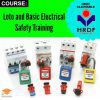7 Steps Approach To Reduction Of Unplanned Breakdown
Original price was: RM1,300.00.RM850.00Current price is: RM850.00.
  |
IntroductionEquipment breakdowns are usually very expensive to fix and also result in substantial opportunity costs due to equipment/ facility downtime. A proactive planned maintenance program can be very effective in reducing such unplanned breakdowns. Moreover it will also ensure a larger life cycle of your machines. So the gain is in reducing costs as well as increase in productivity. Many deferent kinds of related problems can arise with the equipment, machines, and installations on the factory floor: Unplanned minor stoppages (3 minutes or less) that disrupt production. Unplanned medium stoppages (4 to 30 minutes) and Major stoppages (more than 30 minutes) that halt production. Waste from stoppages for Pre-setup, parts replacement, or maladjustments during setup and changeover Stoppages to replace tooling Waste from rework, defects, or poor yield Waste from machines and equipment standing idle due to shortage of parts Waste from lines disrupted by employee absences. These 7 types of wastes are all important, but from the view point of maintenance, the most important kind of waste is defects due to equipment problems. This training is about finding ways to eliminate these wastes quickly and reduce the unplanned breakdown How Will You Benefit
Who Should AttendThis course is suitable for all personnel that are responsible to solve operational issues and response to (internal & external) customer complaints,
MethodologyFor each of the topic covered, the participants are introduced with fundamental concepts and immediately follow-up with related learning activity to facilitate learning. In such, participants are required to perform the tasks through group activity discussion and analysis in a work-relate simulated situation to demonstrate the learning topic outcome. Module
|
Fee: RM 850 per pax
Loyalty Points: 850 Points
Duration: 1 Day
Note: In-house course is available. Request it HERE
Trainer
Prabageran Thiagarayah
Biodata:
Prabageran has more than 13 years of working experience with multinational company in Malaysia. He started his career in 2001 and has held various positions as production engineer, process engineer, manufacturing engineer, senior manufacturing engineer, assistant manufacturing engineering manager and as a performance lean manager with a German-based company in the aluminum industry. Currently, he is the Head of Process Improvement at Port of Tanjung Pelepas, APM Terminals.He holds a Bachelor of Mechanical Engineering (Hons) from University Tenaga National Malaysia and Master’s in Management from Open University Malaysia (OUM). Currently he is pursuing his PhD in Engineering majoring in Lean Manufacturing and 6 Sigma.
Besides that, he also has a Master Black Belt in Lean Six Sigma from Norsk Hydro Aluminium and a Green Belt in Six Sigma from Motorola University. He is a certified Pembangunan Sumber Manusia Berhad (PSMB) trainer.
He has experience in lecturing with Olympia College in Johor and conducting training programs for several multinational organizations and training providers.



